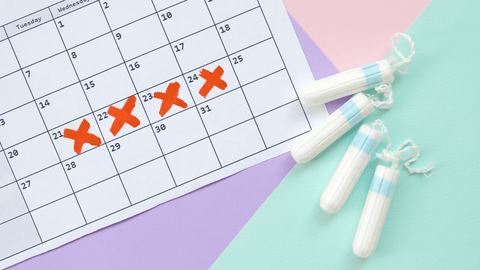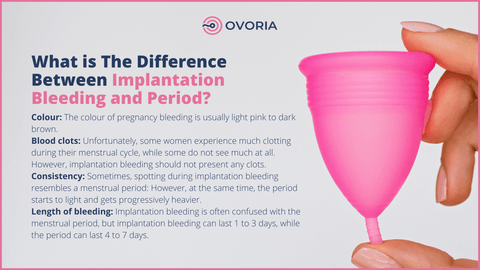What is Implantation Bleeding?
When a couple is trying to conceive, whether naturally or using an assisted reproductive technology (ART), the female tends to be hyper-aware of what's going on in her body. Minor changes are noticed, and excitement is felt over what could be a sign of pregnancy or a sign of something wrong.

What is Implantation Bleeding?
Implantation bleeding is light vaginal bleeding that occurs about 10 to 14 days after conception. We can explain this process like a body's way of preparing for pregnancy. Implantation bleeding happens when the fertilized egg attaches to the uterine lining. Implementation bleeding usually occurs around the time when a woman is expecting her periods. Most women are experiencing implantation bleeding, think they have a normal period, but they might not generally realize that they are pregnant. The most frequently asked question is how long does implantation bleeding? It lasts only one or 2 days.
What is The Difference Between Implantation Bleeding and Period?
What do we need to know about the differences between pregnancy bleeding and period bleeding? Very often, it is hard to differentiate pregnancy bleeding from the period. On which signs do we need to pay attention to understanding the difference?
- Colour: The colour of pregnancy bleeding is usually light pink to dark brown.
- Blood clots: Unfortunately, some women experience much clotting during their menstrual cycle, while some do not see much at all. However, implantation bleeding should not present any clots.
- Consistency: Sometimes, spotting during implantation bleeding resembles a menstrual period: However, at the same time, the period starts to light and gets progressively heavier.
- Length of bleeding: Implantation bleeding is often confused with the menstrual period, but implantation bleeding can last 1 to 3 days, while the period can last 4 to 7 days.
In case if woman start to see changes in her menstrual periods, she needs to contact a healthcare provider who will provide medical advice.

What are The Symptoms of Implantation?
One of the early pregnancy symptoms is implantation bleeding which lasts for a few days. Because the bleeding occurs near the time of a woman's period, many women are confused about whether it's a possible pregnancy or a period.
There is a list of common signs of implantation bleeding:
- Headache
- Mood swings
- Fatigue
- Light cramping
- Abdominal pain
- Breast tenderness
- Morning sickness
- Food cravings
- Nausea
What Causes Implantation Bleeding?
There are many reasons which can cause implantation bleeding:
- Ectopic pregnancy. You may have bleeding with pain and cramps when the embryo implants outside your uterus. It’s dangerous and needs medical care right away.
- Sex. Changes in hormones and other physical factors may be responsible for this. If bleeding is not going to stop on its own, the woman needs to contact her doctor.
- Fibroids and polyps. The doctor needs to direct the woman for doing some tests for checking the growth in her uterus.
- Subchorionic haemorrhage. A subchorionic haematoma occurs when blood collects between the uterine wall and the chorionic membrane in pregnancy.
- Miscarriage. It is also called spontaneous abortion. Miscarriage is when a baby dies in the womb (uterus) before 20 weeks. For women who know they're pregnant, about 10 to 15 in 100 pregnancies (10 to 15 per cent) end in miscarriage.
When to See a Doctor?
It is crucial always to keep monitoring all changes in your body. Moreover, it's necessary to use the ovulation calendar to track menstrual cycles when a woman is ready for ovulation to determine the better days for conceiving or avoiding the pregnancy and for having a regular period. The ovulation calendar will show if something wrong happens with your body. If a woman is experiencing bleeding for a few days that are not typical for her or doesn't look like a menstrual period, and the woman starts to worry about her condition, it is better to contact her health provider to receive medical attention.

